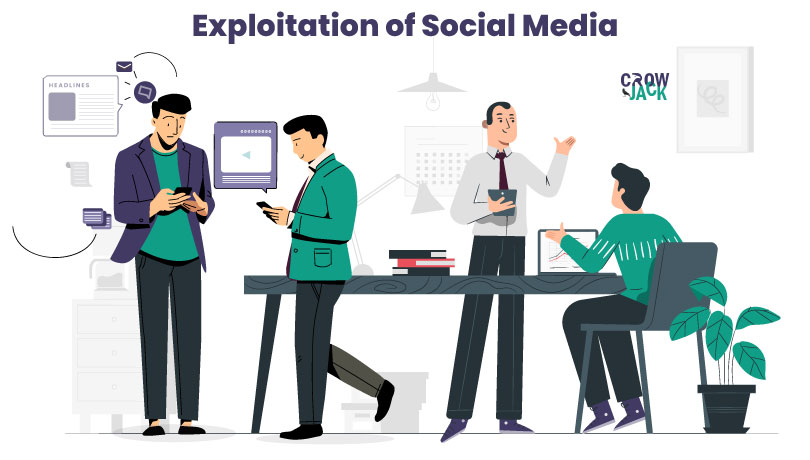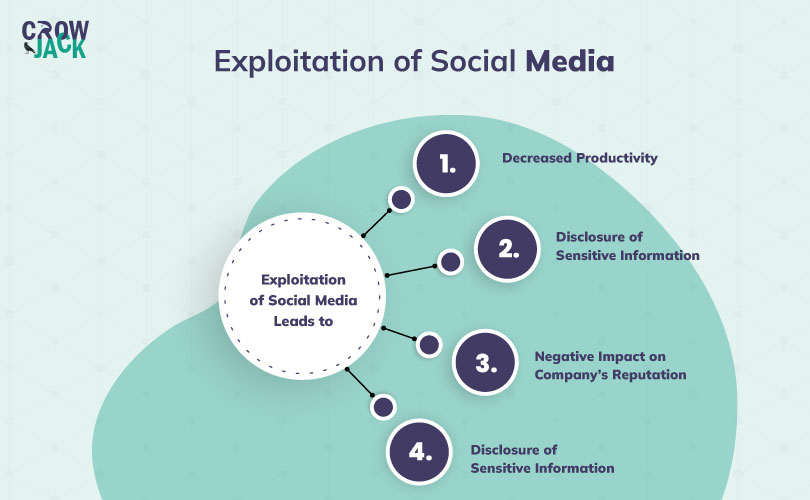Overview
Nobody can deny the fact that the way social media platforms are gaining popularity, everyone's perception about sharing information is transforming with time. However, for every positive side of a coin, there is a negative side as well. In the same way that social media has brought the world closer together and made communication easier, the risks of misusing it are also increasing in every industry, including the corporate world.

If companies use social media effectively, it can enhance a company's reputation, and relationship with internal and external stakeholders, and on the other hand, if not well managed it can come up with multiple risks of privacy invasion and divulgence of sensitive information.
Further elaborating, below given are some of the ethical issues that can occur in a workplace due to social media.
Table of Contents
Issues to misuse of social media

1. Decreased productivity
Social media has become a powerful and gravitating distraction for all including the working class as well. One major ethical issue affecting modern workplaces is the loss of employee productivity as employees overuse social media platforms like Instagram, Facebook, Snapchat, and so on. To substantiate, a study reveals that employees spend two hours per day on social media on average. Furthermore, among remote workers, the distraction by social media is an even more peculiar problem. Subsequently, increased social media engagement is leading to unethical behaviors in the workplace further translating to productivity issues.
2. Disclosure of sensitive information
At times intentionally or unintentionally employees end up disclosing sensitive or private company information on social media in the form of stories or posting about the internal policies of the company on social media platforms. Having said that, a major ethical issue linked to social media is the revelation of details or information that is not meant to be public.
3. Social media outrage against company reputation
It is often seen that in case of workplace conflicts or exploitation by colleagues, employees directly take to social media to express their outrage. They do not report the issue via the established organizational channels and rather directly escalate the issue in the public domain by posting about it on social media. Taking internal matters of the company on social media without reporting them to superiors is unethical as it leads to a dip in company reputation.
4. Increased risks of cyberattackss
On average, 1 in 7 social media accounts is subjected to hacking or malware. Hackers can use private information shared through social media for causing harm to an organization or for different purposes. Besides, they can also hack the official company accounts and post misleading or inappropriate information that can affect the company’s perception as well as stock prices. For instance, in July 2020, Apple’s Twitter account was hacked as a part of a Bitcoin Scam, and that cyber attack had huge implications for Apple.
If a company faces any type of data breach, it is crucial for the company to publicly publish a data breach notification confirming the number and leaked information within a particular number of days published by the country or state.
Measures to avoid misuse of social media
Moving further, below mentioned are various methods in which employers can make sure that utilization of social media does not become an ethical issue in a workplace.
1. Identifying social media risks
Risks of breach of any information can only be dealt with when an effective assessment of all the potential risks is conducted. Hence, it is extremely crucial for employers to identify all the risky factors that could lead to a company's loss of money or reputation so that in return, effective strategies to prevent the risks can be created and implemented. Risks may include employees connecting with the company’s competitors, cyberbullying of co-workers which is itself a form of workplace harassment, or loss of productivity that can also cause communication issues in workplace due to excessive scrolling on social media platforms.
2. Surveilling employees’ accounts
Keeping a check on employees' social media activities will make sure that no employee shares any negative remarks or information about the company that can cause loss to an organization. Employers should make sure that they monitor employees' activities by informing and with the consent of employees, otherwise, they can be alleged of invading the privacy of employees.
3. Providing instructions of usage
Employers should clearly state their expectations regarding employees using social media during working hours during their onboarding process. This will assure that employees will not waste their time on social media or shopping sites.
4. Creating actionable policies for breach
Strict policies regarding serious consequences on breach of sensitive information of the company should be implemented and should be well informed to the employees to make sure that employees are afraid of divulging any information about the company that can affect the company negatively.
There have been many cases in the past that reflected how big companies suffered due to employees indulging in unethical social media practices. Hence, for a better understanding, below given is the case study of a company that experienced serious consequences due to the disclosure of personal data by an employee on social media.
Real-life case study
Bupa employee stole half million a users' data
This is the case of a UK-based health insurance company named Bupa. In March 2017, an employee of the company extracted data from almost 547,000 international customers for personal monetary benefits.
Employees extracted the information from the servers and added all the sensitive information including names, D.O.B, email addresses, and credit card details of consumers across 122 countries. After extracting the sensitive information, the employee uploaded the whole data on Alphabay, the biggest dark market on Dark Web for sale.
The employee was immediately suspended and UK police arrested the employee for the violation of the Data Protection Act 1998. Moreover, the company also released a statement of taking full responsibility for the act and ensuring to increase the security measures to prevent any such occurrences.
However, along with the employee, the company also faced serious consequences of this unethical act. After the investigation, the UK's Information Commissioner's Office (ICO) stated that the company failed to ensure security measures to protect consumers’ data. Hence, the company was also liable to pay £175,000 to the nation. To avoid such risks, companies and individuals are now encouraged to adopt stronger cybersecurity practices, including the use of reliable VPN services to encrypt online activity and protect sensitive information. Many experts highlight VPN solutions in this context, and resources like a Surfshark review can provide valuable insights into choosing the right tool for enhanced data protection.
Key takeaway - We discovered in this case study that the company was careless in not regularly monitoring the systems and was unable to detect unusual activity in the company's server. Furthermore, an employee of the company was engaged in unethical social media practices that were hidden from the company. As a result, both parties faced serious legal action.
FAQs
What are the legal repercussions of social media abuse in business?
Legal impacts from the improper use of social media in business might include copyright infringement, defamation, privacy issues, and regulatory non-compliance. These problems might result in legal actions or fines for the company in question. Businesses must maintain compliance with pertinent laws and regulations and be aware of the legal risks associated with social media use.
What are some of the tools that are available to businesses to prevent social media abuse?
To stop social media abuse, businesses can utilize social media monitoring solutions like Talkwalker and Awario. Talkwalker offers sentiment analysis and real-time monitoring, enabling organizations to quickly identify potential abuse or unfavorable material. Awario monitors brand references on social media platforms, blogs, and discussion boards to assist companies identify cases of misappropriation and take prompt corrective action. Companies can protect their internet reputation, deal with problems quickly, and use these tools to do so.
Previous Issue
Environmental ResponsibilityNext Issue
Favoritism and Nepotism
 Proof Reading
Proof Reading  Copy Writing
Copy Writing  Resume Writing
Resume Writing  Blogs
Blogs Guides
Guides SOP's
SOP's Student Resources
Student Resources Research Topics
Research Topics Login
Login Register
Register